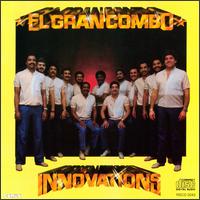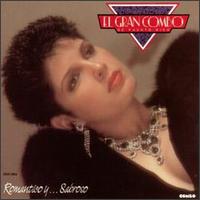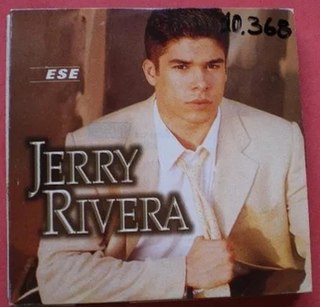
Andrés Montañez Rodríguez, better known as Andy Montañez, is a Puerto Rican singer and songwriter.

El Gran Combo de Puerto Rico, commonly known as El Gran Combo, is a Puerto Rican salsa orchestra based in San Juan, Puerto Rico. Celebrating its 50th anniversary in 2012, it was often considered Puerto Rico's most successful musical group. The group received the moniker La Universidad de la Salsa in Colombia, due to the sheer number of famous salsa musicians and singers who developed their careers with it, who started with the group, or who were occasionally backed up by the band and La India.

Rafael Antonio Cortijo was a Puerto Rican musician, orchestra leader, composer and percussion instrument craftsman.

Roberto Roena Vázquez was a Puerto Rican salsa music percussionist, orchestra leader, and dancer. Roena was one of the original members of Cortijo y su combo and later with El Gran Combo de Puerto Rico. He later became the leader of his own band, "Roberto Roena y Su Apollo Sound", widely considered one of the best Latin salsa bands in Puerto Rico. Roena had also been a long-time member of the Fania All Stars, a salsa supergroup that has enjoyed worldwide success since the 1970s.
Pellín Rodríguez was a Salsa singer. Rodríguez was a member of the musical group El Gran Combo and toured with them all over Latin America and Europe, gaining fame and popularity as a singer. In addition to his singing capabilities, Rodríguez had great comedic abilities and participated on comedy bits on various TV shows in Puerto Rico.

Ismael Rivera a.k.a. "Maelo", was a Puerto Rican composer and salsa singer.

Arroz Con Habichuela (Rice with Bean) is the 2006 studio album by El Gran Combo de Puerto Rico. The Spanish title of the album means "rice with beans" in English which is a popular plate both in Puerto Rico and throughout Latin America. It is the first album featuring new member, Willie Sotelo, on piano who replaced longtime piano player, Rafael Ithier, so that Ithier could focus more on directing the band. Released by Sony International, the album garnered a radio hit with its first single, "No Hay Manera". The album also received the 2007 Latin Grammy Award for Best Salsa Album.
Tropical Albums is a record chart published by Billboard magazine. Established in June 1985, the chart compiles information about the top-selling albums in genres like salsa, merengue, bachata, cumbia, and vallenato, which are frequently considered tropical music. The chart features only full-length albums and, like all Billboard album charts, is based on sales. The information is compiled by Nielsen SoundScan from a sample representing more than 90% of the U.S. music retail market, including not only music stores and music departments at electronics and department stores but also direct-to-consumer transactions and Internet sales. A limited number of verifiable sales at concert venues is also tabulated. Innovations by El Gran Combo de Puerto Rico was the first album to reach number-one in the chart on June 29, 1985. Up until May 21, 2005, reggaeton albums appeared on the chart. After the installation of the Latin Rhythm Albums chart, reggaeton titles could no longer appear on the Tropical Albums chart. By removing reggaeton albums from the Tropical Albums chart, it opened slots for re-entries and debuts. American bachata group Aventura claimed the top spot on the Tropical Albums chart, which marked the first time since the issue dated November 6, 2004 that a reggaeton album was not at the number-one spot. The current number-one album on the chart is Formula, Vol. 2 by Romeo Santos.

Innovations is a 1985 studio album released by Puerto Rican salsa group, El Gran Combo de Puerto Rico. It was the first number-one album on the Billboard Tropical Albums chart, established in June 1985.

Y Su Pueblo (And His People) is the 1985 studio album released by Puerto Rican salsa group, El Gran Combo de Puerto Rico. The album became the group's second album to top the Billboard Tropical Albums chart succeeding the group's previous album, Innovations.

Romántico y Sabroso is the 1988 studio album released by Puerto Rican salsa group, El Gran Combo de Puerto Rico. The album is considered El Gran Combo's first release dominated by the distinct subgenre known as salsa romantica. It was the last album were Edgardo Morales played the drums.

Una Navidad con Gilberto, is the title of a Christmas album released by Puerto-Rican singer Gilberto Santa Rosa on October 14, 2008, by Sony BMG Norte. It was the first time that Gilberto released his own Christmas album. He previous collaborated with various artists on the Tarjeta de Navidad by Sony Discos. In addition, he collaborated with Puerto Rican salsa group El Gran Combo de Puerto Rico on their album, Asi es Nuestra Navidad. The album peaked at number-six in the Billboard Top Latin Albums chart and number twenty-two on the Billboard Holiday Albums chart. It remained on the Top Latin Album charts for thirteen weeks. The album reached number-one on the Tropical Albums where it spent three weeks on the spot. At the Latin Grammy Awards of 2009, the album received a Latin Grammy Award for "Best Traditional Tropical Album".

¡Ámame! is the 1989 studio album released by the Puerto Rican salsa band, El Gran Combo de Puerto Rico. The album became the group's fifth number-one album on the Billboard Tropical Albums chart.

¡Sin Salsa No Hay Paraíso! (2010) is the 63rd album by El Gran Combo de Puerto Rico.

This is a list of notable events in Latin music that took place in 2017.
"Una y Mil Veces" is a written by Cuban singer-songwriter Donato Póveda and performed by Mexican singer-songwriter Cristian Castro on his fourth studio album El Deseo de Oír Tu Voz (1996). The song received airplay on Latin pop radio stations in the United States and peaked at No. 17 on the Billboard Latin Pop Airplay chart. It was later covered by Puerto Rican salsa singer Jerry Rivera on his sixth studio album Fresco also released in 1996. Rivera's version peaked at No. 1 on the Tropical Airplay chart, becoming his third number one song on the chart. Rivera's version was recognized as one of the best-performing songs of the year at the 1997 ASCAP Latin Awards on the tropical field.
"Hay Que Poner el Alma" is a song written by Omar Alfanno and performed by Puerto Rican singer Víctor Manuelle on his 1996 self-titled studio album and was released as the lead single from the album. It became his first number song on the Tropical Airplay where it spent six weeks on this position and was the second best-performing tropical song of 1996. José A.Estévez, Jr. of AllMusic listed the song as one of the album's highlights. "Hay Que Poner el Alma" won "Tropical Song of the Year" at the 1997 SESAC Latin Music Awards which was presented to Alfanno.

"No Quiero Na' Regala'o" is a song by Puerto Rican salsa band El Gran Combo de Puerto Rico from their studio album De Punta a Punta (1971). Written by Perín Vasquez, it deals with the singer not wanting love merely out of pity.

"Ese" is a song performed by Puerto Rican-American singer Jerry Rivera from his ninth studio album De Otra Manera (1998). The song became his first #1 on the Hot Latin Tracks chart and fifth overall on the Tropical Airplay chart. It was acknowledged as an award-winning song at the 2000 BMI Latin Awards. Two versions of the song were recorded, one in salsa and the other a bolero. The success of releasing two versions of the song to Latin radio stations led to Sony Discos having their artists record multiple versions of the same song. José A. Estévez Jr. of AllMusic felt that Rivera "demonstrates with conviction" in the song. Eliseo Cardona of El Nuevo Herald stated that the song "can be taken as a signal of alert It shows in any case that it was already time to get out of the monotony accumulated by his discography After listening to the song it is force majeure to recognize that the latter was fulfilled." The song was later featured as the main theme for the Mexican telenovela Mirada de mujer (1998). The music video for the song featured the ballad version and was directed by Steve Bielo.
This article includes an overview of the major events and trends in Latin music in the 1970s, namely in Ibero-America. This includes recordings, festivals, award ceremonies, births and deaths of Latin music artists, and the rise and fall of various subgenres in Latin music from 1970 to 1979.















